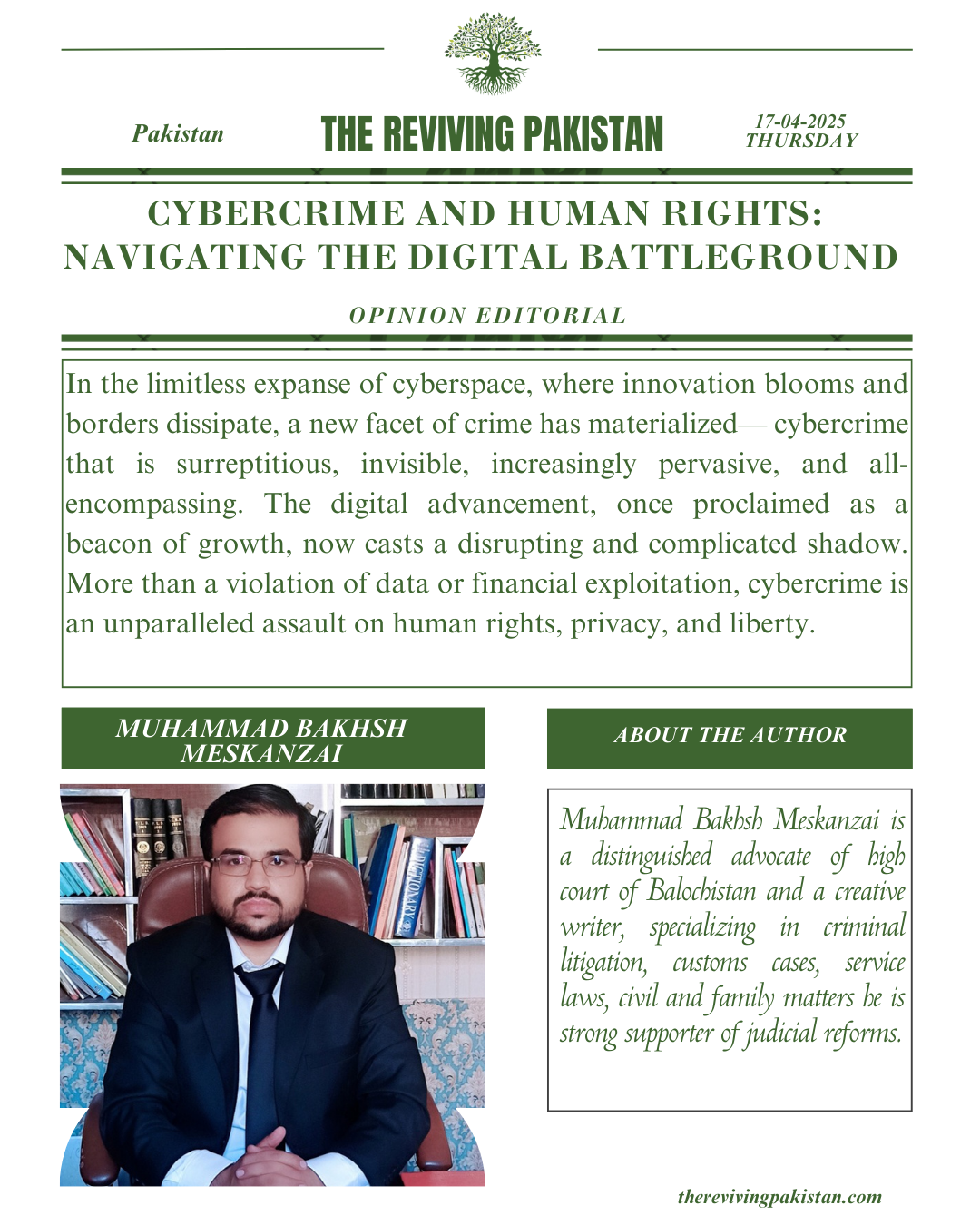
Muhammad Bakhsh Meskanzai
Muhammad Bakhsh Meskanzai is a distinguished advocate of High Court of Balochistan and a creative writer, specializing in criminal litigation, customs cases, service laws, civil and family matters he is strong supporter of judicial reforms.
In the limitless expanse of cyberspace, where innovation blooms and borders dissipate, a new facet of crime has materialized— cybercrime that is surreptitious, invisible, increasingly pervasive, and all-encompassing. The digital advancement, once proclaimed as a beacon of growth, now casts a disruptive and complicated shadow. More than a violation of data or financial exploitation, cybercrime is an unparalleled assault on human rights, privacy, and liberty.
In Pakistan, where the digital revolution is escalating amidst socio-economic trials, this menace is neither remote nor theoretical. It is immediate, it is real, and it is here. The implementation of the Prevention of Electronic Crimes Act, 2016 (PECA) and the current establishment of the National Cyber Crime Investigation Agency (NCCIA) mark appreciable efforts to face this surging threat. However, as technology grows at an unprecedented pace, our moral compass and legal instruments must develop in toto.
The Digital Battlefield: A new frontier for human rights
Human rights—once visualized for the physical world—are now constantly tested in virtual realms. A text, a tweet, a message, a manipulated photo, or a viral video may seem temporary until they demolish reputations, smash mental well-being, or threaten lives. In this domain, the assailant often wears no face, has no trace, respects no la,w and knows no bounds. Here, the victim is not only infringed—they are digitally exiled, making efforts for justice in a space where principles are embryonic and accountability is elusive.
Cyberstalking: A Hidden Menace
Cyberstalking is a hidden threat and a silent form of digital infringement, marked by unaccredited sharing of prohibited content. Veiled in anonymity, it often aims at women and minorities, transforming their online presence into a room of fright, intrusion, and molestation. Additionally, Cyberstalking is not only an online nuisance—it is a psychological blockade. The right to be let alone, the refuge of one’s digital self, is badly breached. Victims suffer silently, navigating trauma in a realm that offers little rescue. The state, under its constitutional duty, must safeguard human dignity and must reckon such crimes not just as offenses but as infringements of the prime freedom.
Spamming: The Gateway to Digital Abuse
Though often dismissed as digital noise, spamming, under Section 25 of PECA, is a corrosive act of intrusion. It sabotages privacy and undermines autonomy, gives rise to scandals and identity theft, and disintegrates digital consent, like an intruder in a private correspondence. The legal maxim volenti non fit injuria badly fails here, as no consent is given. Cybersecurity, hence, is not just technical—it’s about safeguarding the integrity of user choice.
Spoofing: The Catalyst of Fraud
Spoofing is a catalyst of digital fraud through impersonation—be it fabricated emails, fake profiles, or counterfeit sites. It abrades reliance and causes strict financial and emotional harm. In Pakistan, where cyber-literacy is scant, its influence is above and beyond. As fraus omnia vitiate reminds us—fraud corrupts all, rendering rigid enforcement, global cooperation, and powerful cyber forensics essential.
Cybercrime: A Threat to Human Rights
Cybercrime, a menace in itself, is a direct threat to human rights, especially for women and children, whose digital abuse often contributes to real-world harm—harassment, exclusion, job loss, and even suicide. Each assault imposes a wound, seldom punished. The advancing digital divide risks becoming a new type of inequality, while justice strives to match the pace of online crimes.
PECA: a reformative tool
PECA is the chief cybercrime law of Pakistan, but its impact depends on reform, application, enforcement, and modern infrastructure. Lex semper dabit remedium—the law must provide a remedy—must translate into speedy justice and victim support. Pakistan must transition from reactive laws to proactive protection through digital literacy, legal aid, empowerment, and awareness sessions
The Way Forward:
To fight cybercrime efficaciously, cyberspace must be recognized as a human realm, where Digital interactions are protected as rights are safeguarded in the physical world. This requires regular updates to PECA, stronger institutions like NCCIA, and global cooperation to tackle cross-border threats and invasive digital literacy, especially in youth and rural communities. Most importantly, a victim-centric approach—with confidential reporting, counseling, fast-track tribunals, and awareness sessions—is quintessential to ensuring the dispensation of justice and reinstating trust.
Conclusion
Cybercrime is not just a legal issue—it’s a combat against all online crimes, it’s a fight for justice, fundamental rights, dignity, and equality in the digital age. For Pakistan, this is a revolutionary moment: to move from reactive measures to proactive leadership, ensuring technology empowers rather than endangers, and every citizen is protected, valued, and safeguarded online.

